 Nearly any religious person will tell you it is never too late to find God, and the churches agree. For this reason, most of them offer adults the chance to join the church and get baptized. If you have been thinking about baptism to meet your spiritual needs, you may be wondering what to expect. Each denomination is a bit different, but most follow the same basic format.
Nearly any religious person will tell you it is never too late to find God, and the churches agree. For this reason, most of them offer adults the chance to join the church and get baptized. If you have been thinking about baptism to meet your spiritual needs, you may be wondering what to expect. Each denomination is a bit different, but most follow the same basic format.
Choose a Denomination
Before you can be baptized, you must join a church. However, it isn't recommended for you to join a church based on superficial things such as having friends or family who attend or because it is close to your home. Instead, you should research each denomination, comparing and contrasting their beliefs to determine which ones are most in line with your beliefs. There is no rule that you must stick to the first church you attend, so feel free to attend services at several and stick with the one that feels like your second home. Once you decide on a church, you can then begin the process of being baptized.
Learn the Church's Teachings and Prayers
Regardless of the denomination, most churches will require an adult to go through a preparation process to ensure that baptism is right for them. This may include things such as attending a certain number of services, meeting with priests, ministers or bishops on a one-on-one basis, attending Sunday school, or allowing home teaching. The amount of time you spend preparing for baptism varies from church to church and is based on your own needs.
Scheduling the Baptism
Once you have prepared, the church will help you schedule the baptism. This also varies depending on denomination. For example, Catholic churches often hold public baptisms near Easter. Many other denominations allow you to have a private baptism ceremony and invite people who are close to you. Each baptism will include a number of the same elements.
Scripture Reading
Whoever is officiating your baptism will likely begin by reading scripture from the Bible that relates to getting baptized. There are some commonly used passages among most churches.
- Matthew 3:13 17
- John 1:29 33
- Luke 3:21 22
- Mark 1:9 11
Group Prayers
Once the officiant of the baptism provides the introductory scripture, he or she will lead the group in prayer. The most common type of prayer at a baptism is known as an invocation and involves asking God to be present with the person being baptized as well as the people in attendance. Denominations that use liturgies will use one for this prayer. Those that don't will pray using their own words.
Profession of Faith in God and the Church
At this point in the baptismal ceremony, the baptismal candidate will profess his or her love for God and the church. Sometimes this includes a series of questions that must be answered regarding whether the candidate has renounced evil and accepted Jesus Christ. Other denominations simply have the person being baptized repeat a statement of faith. Typically, a profession of faith includes acknowledging sin and recognizing Jesus Christ as the savior.
Application of Water for Cleansing
Depending on the denomination, the application of water for cleansing the spirit may include a simple sprinkling of water or it may involve pouring water over the head. Some denominations require full immersion in order to be considered baptized. The officiant will pronounce the baptism during the application of water.
Final Words
After the baptism is complete, the minister or priest says a final prayer thanking God for his forgiveness of the baptized's sins. After praying, the officiant introduces the newly baptized person and welcomes him or her as an official member of the church.
Regardless of which denomination you choose or when you hope to be baptized, ensure you are making the decision for yourself. If you do it simply because someone else wants you to, it will be for the wrong reasons and you will not get the fulfillment you hope for from the process.
Add Your Comment